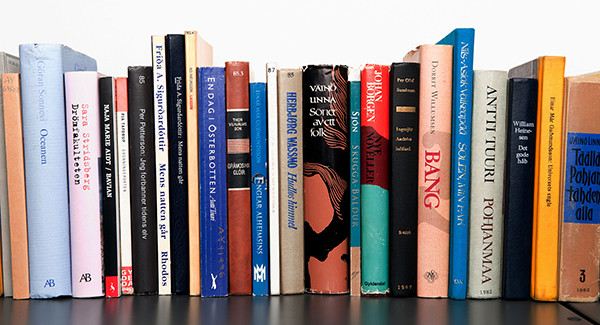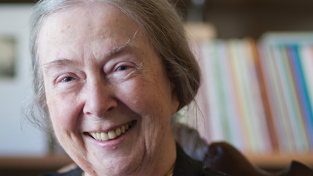
Books or Bytes: Are You Ready For The Future?
Libraries are serving lattes and muffins, and local bookstores seem to be going the way of the blacksmith shop. Last summer, Amazon announced that e-book sales outpaced hardcover books by almost two to one. And several companies are developing ATM-like machines that dispense print-on-demand books instead of $20 bills. We can’t help but wonder, will books even exist twenty years from now?
“I’m not sure yet what the digital revolution has done,” admits Deb Futter ’80, vice president/editor in chief, hardcovers for Grand Central Publishing, “and I don’t think anyone is. It’s still happening. Everyone said television was the end of radio and that didn’t happen.” The industry powerhouse is married to a writer, William D. Cohan. “During our discussions about the future of the book, despite being on different sides of the business, we both believe that the book will live on, certainly in our lifetime.”
The question is, in what form? It’s all happening so fast, even industry insiders can only guess. Lane Zachary ’75, a literary agent in New York and Boston, predicts that in twenty years, hardcover books will be extinct. “Technology is going to take us someplace dramatically different. We’ll have paperbacks and something like the Kindle, which by then will be seen as a dinosaur.”
The shift already happened in the music business, says Zachary. “At one time, everything was the album, then eight-tracks, cassettes, CDs, and now downloads. I see publishing as having a similar arc, and we have to reinvent ourselves to keep up with these changes.” Traditional publishers have been “slow to adapt,” agrees Priscilla Painton ’80, editor in chief of Simon & Schuster’s adult trade division. “But over the last two years, a whole new industry has come into existence to produce new digital products that we’re still calling ‘books.’ Also, the devices are getting better and appeal to all age groups.”
Digital natives, who’ve grown up with computers, eagerly embrace e-books. When Simon & Schuster put its teen readers’ book club online, providing e-versions instead of print books, its membership soared from 3,000 to 20,000 in one year. “More and more preteens are online now,” says Bethany Buck ’84, a vice president and publisher in Simon & Schuster’s children’s book division. “Digital opportunities give us a way to be more creative. In the future, kids might have multiple versions of the same story. And picture book e-books are likely to be significantly different—tons more content and additional features in digital form. It’s not a paperback and not a hardcover. Writers have to think of it as another format.”
Although e-books now account for only 10 percent of book sales, Forrester Research predicted that 10.3 million people in the US would own e-readers by the end of 2010, up from 3.7 million in 2009. Even now, says Dan Visel, researcher at the Institute for the Future of the Book, “Almost everything that’s ever been printed is available to anyone with a computer.”
But what does this all mean to aspiring writers? There is definitely more competition, and fewer traditionally published books make it to market. Publishers and agents are less likely to take a chance on an unproven novice. Advances are also lower, and the quick read seems to be edging out books that require more time and contemplation.
“It’s a different world now than when I sold my first novel in 1996,” says Zachary. “It’s harder to sell literary fiction. Editors want blockbusters, and now that the economy has truly declined, it’s even more difficult. Editors that I once worked with on literary fiction are now cookbook editors.”
With fewer magazines and newspapers, fewer ad pages, and more journalists freelancing, it’s even worse for nonfiction writers. “I got to the party just as they were closing the open bar!” quips Christine Muhlke ’92, food editor at the New York Times. “It’s a competitive market without the kind of outlet for good writing that we’ve had in the past. Now I’m telling top writers, ‘We can give you $50 for a blog post.'”
A key advantage of technology is that it broadens the definition of a book and makes the reading experience more social. Writers can interact with readers in ways that were impossible in the past. “Authors have become real people,” says Buck, “not just photos on a jacket.”
Some authors enjoy the give-and-take. “It’s why you write: to connect with people, to grow the mind, and to have a dialogue,” says mystery writer Sibella Connor Giorello ’85. “Over half the people I’m friends with online are readers.” Giorello believes we’ll also read more because of digital readers.
“This could be a golden age to be a writer,” she adds, “because you can also self-publish, which means you’re not beholden to a gatekeeper to tell you if your book is worthy or not.” Priscilla Painton agrees, “It’s going to be harder and harder to say, ‘I wrote a great American novel, but I couldn’t get it published.’ A good novel still has to be a good novel to be read very widely, but there are more mechanisms now for getting attention.”
How Writers Can Thrive in the New Word Order
Whatever route you take, the going will be a bit smoother if you prepare for the trip. Here, then, is “W-R-I-T-E”—a compendium of advice from alums who have been in the trenches.
Write
To state the obvious, writing takes skill, knowledge, and practice. “Too many people who aren’t qualified want to write books,” says Lane Zachary. “I get so many manuscripts from people who have never studied the craft, yet they want to write books about being in prison or overcoming a disease. Most of the time, these manuscripts serve as therapy for the writer, but they are not well-told stories that are ready for publication.”
Corinne Demas, a widely published MHC professor of English, has mentored many now-successful writers and editors. “Our students are lucky because they’ve had workshop experience. They know how to look at a text. Critiquing other people’s work helps them become better writers.”
Carol Higgins Clark ’78, author of thirteen bestselling mysteries, stresses that “the business of writing may have changed, but the part about learning how to tell a story hasn’t.” Find a writing class in your area, she suggests, “where you can get constructive feedback from a writing teacher.”
Blogging is a good way to practice the craft and to “have the most people possible look at your work,” adds Christine Muhlke. “Editors look at blogs. I’ve definitely assigned pieces based on them.”
Read widely, and expose yourself to a variety of styles and types of writing. Even if you’re drawn to a particular genre, says Muhlke, think of your writing as a retirement fund: diversify. “Advances are a quarter to a third of what they used to be. You can’t just write books, just copyedit, just blog, or just write for magazines. You can’t put your writing all in one place.”
Research
“If you want to be a smart author,” says Bethany Buck, “get to know the trends.” Also read what’s already been written on your topic. “You have to make sure you have a unique idea before you make a pitch,” says Muhlke. “I can’t tell you how many people send ideas that were in another magazine.”
Educate yourself about the business, too. “Start in a bookstore,” suggests Rebecca Fabian ’07, a sales assistant at Beacon Press who previously worked at Barnes & Noble and the Odyssey Book Store and interned at Houghton Mifflin. “It’s a great way to get to know the publishers and what they print.” Read trade magazines, too, to learn about advances, royalties, rights, and other aspects of the business.
Know your options. Most publishers don’t accept unsolicited manuscripts, so if you go the traditional route, you’ll need an agent. If you decide to self-publish, know what you’re in for. Who will edit and format your manuscript and help you market the book?
Writers Marketplace is a classic source of information; so are college connections. Deb Futter landed her first job at Bantam Books “because the person who needed an assistant had previously hired a Mount Holyoke grad.” When Karen Tucker LeFrak ’69 was working on her third children’s book earlier this year, MHC’s Office of Development suggested Professor Demas. “I asked her about the number of manuscripts you can present at one time, how long it takes to hear back. As a seasoned writer, she was a person I could trust as a friend in the field.”
Interact
Thanks to the Internet, the twenty-first century is all about connections—blogs, authors’ Facebook pages, and myriad other reader/writer “communities.” Most sites allow you to comment or at least be a fly on the wall. If you’re skittish about socializing online, think of it as a big cocktail party, and do what you’d do in person: make interesting comments, ask thought-provoking questions, seek help when you need it. Find favorite sites and drop in when you can. Becoming part of the conversation not only eases the loneliness of the long-distance writer; you also gain a posse of like-minded comrades.
Tech-ucate Yourself
Karen LeFrak was taken aback when her publisher first asked, “Are you going to join Facebook?” LeFrak was inspired by a real-life experience to write her first book, Jake the Philharmonic Dog. “It combined all of my passions—education, music, and dogs.” She went on tour, and the book did well. But that was 2004. For her newest book, Best in Show, she needs “an online presence.”
If you haven’t sampled social media yet, it’s time to “techucate” yourself. Start by writing a pithy profile of yourself to establish your online identity. Learn the mechanics of posting. Sites like Facebook make it easy; blogging software is a little trickier, but not hard. And if it all feels overwhelming, find a mentor who’s half your age.
“These skills are mandatory for writers today,” says Christine Muhlke. “I wouldn’t even look at a resume from someone who didn’t have online experience.” Social media can also help you tighten your prose. “Younger writers are already succinct, because they’re used to tweeting. It’s surprisingly useful.”
Brevity is also essential when “pitching” an idea. “Do everything by e-mail,” Muhlke suggests. “Editors and agents don’t answer the phone.” But even with e-mail, she adds, “you have about two seconds of attention. I can’t tell you how often editor friends and I have said, ‘It was a good idea, but it took a page to get to.'”
One caveat: The demands of social media leave less time for writing. “If Hemingway were alive today, they’d be bitching because he doesn’t have a blog,” jokes Giorello, mindful of the new expectations.
Edit, and Experiment
Professor Demas gives the same wear-two-hats speech to today’s writing students that she always has: Write “joyfully” and without constraints. However, once your story is on paper, step back and put on your editor’s hat. “Ask yourself, ‘Who’s my audience, what am I trying to accomplish, and what can I do to make this clear and original?’ Be objective. Make believe it isn’t yours anymore.”
Still, in the current publishing climate, writers also have to think outside the book. “Digital readers are going to change what we write,” Giorello predicts. The new formats, which allow you to research as you read, says Dan Visel, promote a more distracted, but also a more informed, kind of reading. “Readers will expect hyperlinks within a novel,” says Giorello. “For example, when my character mentions a mineral, sodalite, the reader will want to click on it. It’s almost like putting a bibliography into a novel.”
Of course, it also depends on the type of book you’re writing and your target audience. But given the new possibilities, why not ask yourself whether photographs, links, videos, or even games might enhance your text.
Be creative in marketing your book, too, because it’s increasingly harder to get, and keep, readers’ attention. “The challenge is trying a whole palette of ways to sell books,” says Painton. “I see that as an advantage. But it depends on whether you choose to see the glass as half empty or half full.”
None of us knows what lies ahead, but, as Lane Zachary points out, “You can never stop progress. We have to be open to new possibilities and not be frightened by them.”
—By Melinda Blau
This article appeared in the winter 2011 issue of the Alumnae Quarterly.
MORE OF THE WRITE STUFF
For Writer’s Digest’s latest list of the top 101 Web sites for writers, and other tips, see alumnae.mtholyoke.edu/writestuff.
March 26, 2012









